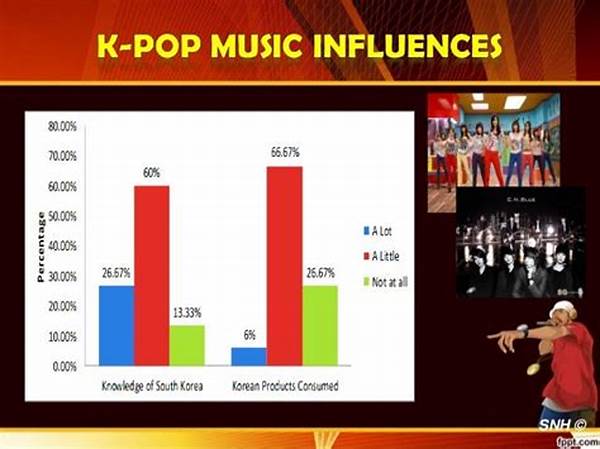In a world where music transcends borders, K-pop has emerged as a global powerhouse, shaking up the music industry like never before. The K-pop influence on music industry is undeniable and unstoppable, as it continues to revolutionize how music is created, marketed, and consumed. This wave from South Korea isn’t just about catchy songs and mesmerizing choreography; it’s a cultural movement reshaping the industry on a global scale. The magnetic pull of K-pop is drawing fans from every corner, uniting cultures through rhythm and beat. So, let’s dive into how this phenomenon is leaving its mark on the music world.
Read Now : Unplugged Interpretations Of Famous Songs
Global Domination of K-pop
The K-pop influence on music industry is nothing short of mind-blowing. With groups like BTS and BLACKPINK leading the charge, the genre has climbed international charts, smashed records, and introduced innovative concepts that Western music is quick to emulate. These groups aren’t just bands; they are brands, with a massive army of dedicated fans, the “stans,” who power their success through social media and streaming platforms. K-pop’s polished production methods, rigorous training systems, and dynamic visual and musical elements have raised the bar for artists everywhere, setting new standards for performance and engagement. Its multilingual approach, incorporating Korean, English, and other languages, broadens its appeal, making K-pop not only a music genre but a cultural juggernaut in the global arena.
The Evolution of Music Collaborations
1. K-pop’s collaboration game is lit, with artists teaming up across language barriers, proving the K-pop influence on music industry is mega.
2. These partnerships blend styles, creating bangers that are not just songs but cultural exchanges everybody’s vibing to.
3. Western artists tapping into the K-pop scene are proof that K-pop influence on music industry is a must-have street cred.
4. These collabs bring a fusion that enriches both the traditional and modern music landscapes, showing K-pop isn’t just a phase.
5. For real, the cross-pollination of K-pop and Western beats keeps the industry fresh and exciting AF, and everyone’s here for it.
Social Media’s Role in K-pop’s Rise
Social media has played a pivotal role in how K-pop influence on music industry spreads like wildfire. Platforms like Twitter, Instagram, and TikTok are buzzing hives for K-pop fans, who are not shy to trend their idols’ achievements with global hashtags. The real-time updates, fan interactions, and sneak peeks into the lives of K-pop stars humanize these icons, making fans feel intimately connected. This digital-first strategy has cut out traditional gatekeepers, letting fans and artists interact directly. Consequently, K-pop artists craft content tailored to online platforms and engage with global audiences, making the music feel personal and accessible. It’s no wonder their digital-savvy approach has quickly become a benchmark, making traditional marketing seem outdated and pushing the entire industry to rethink their strategies.
Read Now : Popular New Merengue Singles
Merchandise and Cultural Impact
It’s no cap that K-pop influence on music industry also hits hard with the merch game. From lightsticks to exclusive fashion collabs, K-pop fandom is not only about the music but an entire lifestyle. The unique visual style, from iconic outfits to vibrant music videos, influences fashion trends worldwide. Artists like G-Dragon and Lisa inspire fans to mimic their styles, resulting in a cultural diffusion that extends beyond just entertainment. Concerts become full-on events, combining music with fashion shows, cultural showcases, and immersive fan interactions. This merchandising prowess reflects how deeply K-pop has immersed into the everyday lives of their fans and carved a niche that is both aspirational and accessible, completely redefining how artists engage with their audiences.
K-pop’s Business Model
How K-pop Redefined the Industry Playbook
So, guess what? The K-pop influence on music industry doesn’t just stop at the thrill of the beat or the dazzle of the concerts. It’s a whole new way of doing music business. The industry’s training and development systems are next-level intense. We’re talking rigorous training camps where soon-to-be idols hone their singing, dancing, and even acting skills like pros. And then there’s the whole multi-layered marketing strategy – a well-oiled machine, from relentless social media engagement to perfectly choreographed music videos. They keep fans hooked and wanting more, flipping the script on how the rest of the world does the music industry.
Fan Interactions and the Changing Dynamics
K-pop fans, the lifeblood of K-pop influence on music industry, are all in. These fandoms aren’t just passive listeners; they’re a full-on community, creating an electric atmosphere that even the big leagues can’t ignore. Fan meets, virtual concerts, and interactive V Live sessions make fans feel like they’re part of the band’s journey. It’s like flipping the script, as artists listen to what fans want. The game is now about connection, where artists genuinely appreciate fans, making music a shared experience rather than a one-way street. This dynamic is gold, making everyone else in the industry sit up and rethink their fan strategies.
Capping the K-pop Influence on Music Industry
To wrap it all up, the K-pop influence on music industry is a massive game-changer. The blend of top-tier performance, fan interaction, and strategic marketing positions K-pop as a formidable force in the global scene. Artists aren’t just idols but culture-makers, shaping tastes and preferences worldwide. So, yeah, K-pop is here to stay! As the music industry continues to evolve, other players are taking notes, trying to capture a bit of that K-pop magic. The industry’s transformation, led by this vibrant genre, isn’t slowing down. It’s reshaping everything we thought we knew about music, proving that in the world of K-pop, normal rules just don’t apply.
